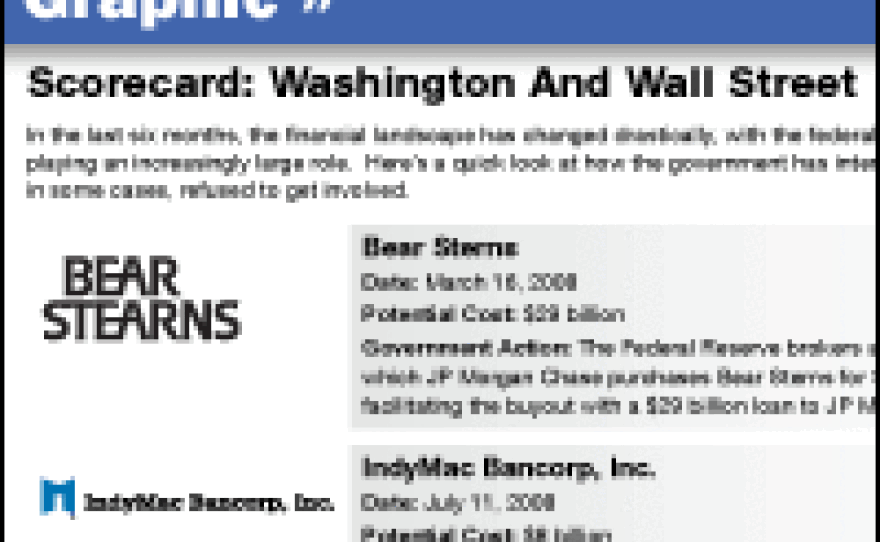

With the government's $85 billion loan to American International Group — and its controlling stake in the company — the United States is now in the insurance business.
AIG is the largest commercial and industrial insurer in the nation, NPR business correspondent Adam Davidson told Steve Inskeep. The company also offers lines for individual customers in the U.S. and around the globe. The more traditional aspects of AIG's business continue to perform fairly well.
But a few years ago, AIG got involved in a new aspect of the financial system: It joined in the selling of so-called credit default swaps. A credit default swap, or CDS, is essentially insurance on debt.
Gambling On The Future
Imagine a bank that has bought bonds from, say, the Port Authority of New York and New Jersey. That means the bank holds debt from the Port Authority. With any loan, there's always the risk of the debtor's failing to pay the money back. To protect themselves, bankers began buying credit default swaps. If the Port Authority failed to keep its end of the bargain, the bank could call up its insurer and cash in its CDS.
AIG treated its CDS business the same way it treated all the other lines. Insurers sell policies for lots of cars and houses, betting that only a few customers will have wrecks or devastating fires.
"Any one house burning down doesn't increase the likelihood that lots of other houses will burn down," Davidson said. "That doesn't apply to bond insurance."
In the case of bonds, one default can create a domino effect. Investors lose confidence in the market. Interest rates spiral. Borrowers can't find new capital to stay afloat.
"As far as we can tell, AIG didn't quite think this one through," Davidson said.
As AIG Goes, So Goes The Global Economy?
Why would a company as large as AIG gamble its future on a new twist in the financial system? The lure of money may have been too strong, Davidson said. The CDS market has grown into a $70 trillion annual business. Davidson likens the situation to AIG saying, "Hey, we know insurance better than anyone. We're going to get into that business."
The pure size of the CDS business is enough to make a failure of AIG a threat to the entire global economy. What's more, the CDS market is far from transparent. "Nobody knows exactly who has them and where they got them from," Davidson said. The fear is that AIG has insurance banks all over the world for trillions of dollars that would suddenly be at risk. If AIG collapsed, banks would stop lending money to each other.
"If that stops, global economic activity stops," he said. "We don't know that that would have happened, but it seemed like a real possibility. And that was why the government stepped in."
Copyright 2022 NPR. To see more, visit https://www.npr.org. 9(MDAzMjM2NDYzMDEyMzc1Njk5NjAxNzY3OQ001))





